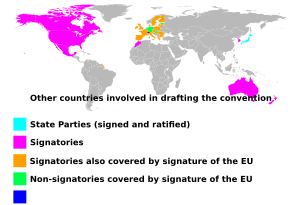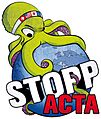Anti-Counterfeiting Trade Agreement facts for kids
The Anti-Counterfeiting Trade Agreement (or ACTA) was an international treaty that aimed to make it easier to fight against product piracy. It wanted to protect intellectual property, which means people's original ideas and inventions. This included stopping counterfeits (fake products) and copyright infringement (using someone's creative work without permission). It also looked at rules for generic drugs, which are cheaper versions of brand-name medicines. ACTA was built on an older agreement called TRIPS.
Only Japan has officially approved this agreement. The European Union also signed it, but many people in Europe were against ACTA. They worried it could affect human rights, especially the freedom of expression and privacy online.
Contents
What is ACTA?
ACTA was an agreement between several countries. Its main goal was to create stronger rules to stop the making and selling of fake goods. These fake goods can be anything from designer clothes to medicines or electronics. The agreement also aimed to protect the rights of people who create original works, like artists, writers, and inventors.
Protecting Ideas and Products
When someone creates something new, like a song, a book, or a special invention, they have "intellectual property" rights. These rights mean they own their idea and can decide how it's used. ACTA wanted to make sure these rights were respected around the world. It aimed to stop people from copying products or ideas without permission. This helps creators earn money from their hard work and encourages new inventions.
Why Was ACTA Proposed?
The main reason ACTA was proposed was because fake products cause big problems. They can be unsafe, like fake medicines, or they can hurt businesses that make real products. When people buy fake goods, the original creators lose money. This can stop companies from investing in new ideas and jobs. ACTA wanted to make it harder for counterfeiters to operate across different countries.
Who Supported and Opposed ACTA?
Many countries were involved in talking about ACTA. Some supported it because they wanted to protect their industries and creators. Others had serious concerns about what the agreement would mean for their citizens.
Countries Involved
The countries that negotiated ACTA included Australia, Canada, the European Union, Japan, Korea, Mexico, Morocco, New Zealand, Singapore, Switzerland, and the United States. These countries worked together for several years to write the agreement. Each country had its own reasons for joining the talks, often related to protecting their own businesses and creative industries.
Concerns and Protests
Even though ACTA aimed to fight piracy, it faced a lot of opposition. Many people, especially in Europe, worried about its impact on freedom of expression and privacy online. They were concerned that internet service providers might have to monitor users' activities more closely. There were also worries that ACTA could make it harder for people to get affordable generic drugs, which are important for healthcare in many parts of the world. Large protests took place in many cities, showing how strongly people felt about these issues.
What Happened to ACTA?
Because of the strong public opposition and concerns from various groups, many countries decided not to approve ACTA. The European Parliament, which represents citizens in the European Union, voted against the agreement in 2012. This was a major step that stopped ACTA from becoming law in the EU. As a result, the agreement has not gone into effect for most of the countries that signed it. Only Japan has fully approved it.
Images for kids
-
Stakeholders' consultation meeting on 21 April 2009 at the Charlemagne building in Brussels
-
Protests in Poland, January 2012
-
Protests in Denmark, February 2012
-
Anti-ACTA demonstration in Tartu, Estonia. 11 February 2012
See also
 In Spanish: Acuerdo Comercial Antifalsificación para niños
In Spanish: Acuerdo Comercial Antifalsificación para niños
 | Chris Smalls |
 | Fred Hampton |
 | Ralph Abernathy |









